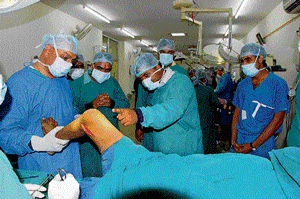
Eighteen-year-old Ishwar Singh of the backward Dungarpur district in south Rajasthan came to Udaipur about 15 years back crawling, as both his legs were incapacitated by the debilitating polio.
He had lost his self-esteem and pitied himself as he had become a burden on his poor parents while youth of his age were supporting their families. It was believed that once affllicted by polio there was no cure and life is lost forever. Polio correction operations were rarely done.
But life changed forever for this young man after he reached the Udaipur-based Narayan Sewa Sansthan (NSS) about which he had heard from one of his relatives. He underwent a series of polio correction operations on both his legs at the polio hospital run by the organisation. Finally, he was able to stand on his own legs. The NSS gave him a job as a receptionist and he is now a happy and contented man with the organisation helping him to find a life partner.
An emotional Ishwar Singh said: “Once, I used to be a burden on my family... but, now I am taking care of my family... I dreamt of walking on my legs but I had never thought that my dream would turn into a reality... ”
The NSS has changed the lives of thousands of such hopeless poor, handicapped people with polio for the last 28 years. People from all parts of the country come to the hospital which offers free treatment and boarding and lodging to not only the patients but also their attendants.
Kailash Agarwal “Manav”, who was employed with the Telecommunication Department, narrated how he had become an instrument of change for the disabled and the idea of setting up a hospital struck.
Some 25 years ago and to be precise in October 1985, it happened. As usual, he went to the Maharana Bhupal hospital on a routine weekly visit to enquire about the well-being of the patients admitted there. He saw Kisna, an old patient who was served a few chapatis by the hospital, putting one chapati under his pillow.
Kailash Agarwal asked the old patient: “How will you survive, if you don't take proper meals.” With tears filled in his eyes, he replied: “Although I am hungry, I am helpless. If I eat all chapatis, my brother and his son will be deprived of them. They neither have flour nor money to buy them. For the last four days, we are forced to share the meals.”
This touched the heart of Kailash and disturbed his mind even after he returned home. He was restless throughout that night. The next day was Dusshera and he narrated the incident to his neighbours and advised them to collect a fistful of wheat flour from every house, prepare chapatis and distribute them among the attendants of the patients, admitted in the hospital. Everyone gave consent for the same. That marked the birth of the NSS.
Today, the NSS is known worldwide for its various free services to destitutes, disabled, poor and needy people. The organisation has successfully extended its services to the remote tribal areas, where regular camps are held for medical check- up, distribution of food, clothing and study material. People from all over the world donate and it has taken the organisation reach this level, Kailash, who adopted the nick name “Manav”, said.
During this service journey of 28 years, the NSS has succeeded in establishing more than a dozen polio hospitals and successfully conducted free of charge corrective surgeries of more than 1.55 lakh polio patients. Every day, over 100 corrective surgeries are conducted at the hospitals of the organisation.
The present president of NSS Prashant Agarwal, who is Kailash Agarwal's son, said the organisation also provides help for poor patients for heart and other complicated surgeries. For the economical rehabilitation of the disabled people, the organisation conducts free training on repairing of mobile phones and electronic items, computer hardware and networking, home appliances repairing and sewing.
Twice a year, the NSS also organises marriage ceremonies of the disabled young boys and girls. About 800 disabled couples have married till date. The 20th free marriage ceremony of the disabled shall be organised by the NSS on June 23.
Apna Ghar (a home for the destitute) is also being run by the organisation. About 200 orphan, deaf and dumb and mentally retarded children reside here and are being educated for free, since the time of its establishment. About 300 to 400 polio patients are examined every day at the hospitals of the NSS.
Poor children from tribal areas are being adopted by the organisation for quality education in public schools of Udaipur. Thus, the NSS has been doing a yeomen service for the disabled and marginalised.